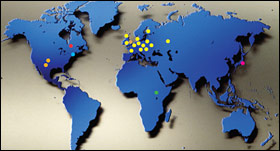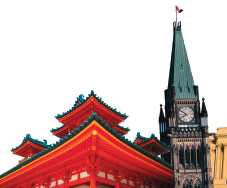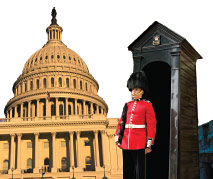Next: Going to (social) work
Posted Jun. 15/07

A good education finds a balance between theory and practice, providing knowledge and developing skills. Through cooperative work placements, internships and exchanges, the Faculty of Public Affairs connects students with the world.
Whether through studies abroad for a semester or a year with Carleton’s international partner institutions, cooperative work placements with 500 participating employers, or academic field placements like those featured on pages 3 and 6, students gain hands-on skills while applying theory learned in class.
Here are some of the ways students are connecting to communities around the world.
—
Austria, Belgium, Denmark, England, Finland, France, Germany, Hungary, the Netherlands, Poland, the Russian Federation, Slovakia, Spain, Scotland, Wales, Rwanda.
After two years of full-time study in a degree program, Carleton students have the opportunity to spend a semester or a year studying at a university in a different country. Today, Carleton has 84 exchange partners in 29 countries.
The Institute of European, Russian and Eurasian Studies (EURUS) encourages students in their third or fourth year to participate in exchange programs across Europe. Many EURUS students also take the opportunity to study Russian in the summer at St. Petersburg State University (Russia), which houses Carleton’s oldest exchange program. The institute offers some bursaries to support participation in the exchanges.
—
Ottawa, Ontario
Cooperative work experiences abound in Canada’s capital. The Career Development and Cooperative Education Office facilitated work opportunities for Faculty of Public Affairs students in organizations such as the Department of Foreign Affairs and International Trade, Public Works and Government Services Canada and Canada Border Services Agency in 2006-2007. Regular placements include up to 12 months in real-world jobs with the CBC, the CRTC and the Department of Canadian Heritage for BA students in mass communication.
Thanks to a grant from the former Canadian Pacific Charitable Foundation and funds raised through the annual Arthur Kroeger College Awards for Public Affairs dinner, students in Kroeger College can have up to 50 per cent of their co-op salary funded by the college when they work in charitable organizations.
“The not-for-profit sector has scarce resources but provides a great work experience to students, so the financial assistance makes it possible for students to work in areas like family services, leadership training and international development,” says Eileen Saunders, director of the Arthur Kroeger College of Public Affairs and associate dean of the faculty.
Students taking a concentration in law, policy and government in the bachelor of law program have an option of taking a one-term, full-time internship. Working for a government department or a governmental or non-governmental organization helps integrate academic and practical aspects of law relating to policy in government decision-making.
Eligible fourth-year EURUS students are also eligible to apply to the institute’s volunteer internship program, involving placements in government agencies and non-governmental organizations in Ottawa.
—
Washington, DC
The Washington Center for Internships and Academic Seminars, the world’s largest provider of government and non-governmental internships, is open to third- and fourth-year political science and master’s students. Granting a full-semester credit, the program enables students to spend a semester or summer term in DC, interning in placements such as Congress, executive agencies, the Canadian  Embassy, law offices, or the voluntary sector. Students intern at least four days per week and take two additional seminar courses offered by the center. Complementing the creation of the concentration in North American politics, the Department of Political Science signed an agreement with the Washington Center in 2006 to integrate practical and theoretical aspects of studies in North American and US politics.
Embassy, law offices, or the voluntary sector. Students intern at least four days per week and take two additional seminar courses offered by the center. Complementing the creation of the concentration in North American politics, the Department of Political Science signed an agreement with the Washington Center in 2006 to integrate practical and theoretical aspects of studies in North American and US politics.
—
Butare and Kigali, Rwanda
 More than 20 Carleton journalism students have already travelled to Rwanda to work as media interns through The Rwanda Initiative, the partnership between the School of Journalism and Communication and its counterpart at the National University of Rwanda (NUR). Another 10 will go to Rwanda by the end of the summer. All of the interns post blogs at rwandainitiative.ca. The media internship program, an offshoot of Carleton’s journalism teaching and media training project in Rwanda, has seen students work as reporters with newspapers, radio stations and TV Rwanda. Two Carleton students also visited the NUR as exchange students and one recent graduate of Rwanda’s journalism program is now doing her master of journalism at Carleton.
More than 20 Carleton journalism students have already travelled to Rwanda to work as media interns through The Rwanda Initiative, the partnership between the School of Journalism and Communication and its counterpart at the National University of Rwanda (NUR). Another 10 will go to Rwanda by the end of the summer. All of the interns post blogs at rwandainitiative.ca. The media internship program, an offshoot of Carleton’s journalism teaching and media training project in Rwanda, has seen students work as reporters with newspapers, radio stations and TV Rwanda. Two Carleton students also visited the NUR as exchange students and one recent graduate of Rwanda’s journalism program is now doing her master of journalism at Carleton.
—
Leeds, England
Senior political science students have an exciting opportunity for practical internships in the Carleton-Leeds Parliamentary Exchange Program. Providing academic study and internships with Members of Parliament in Ottawa and London, England, the program has allowed honours students in political science to spend time abroad since 1990.
—
United States, Mexico
The Centre on North American Politics and Society, affiliated with the Department of Political Science, is dedicated to the study of the evolving relationships among Canada, Mexico and the United States. For the past six years, the North American Mobility Exchange Program has given graduate and senior undergraduate students the opportunity to study at participating universities in the United States or Mexico for one term.
—
Japan
Since 1988, the Norman Paterson School of International Affairs has had an academic exchange with the Graduate School of International Relations at the International University of Japan.